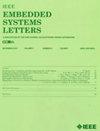运行时重构对fpga加速puf实现的影响
IF 1.7
4区 计算机科学
Q3 COMPUTER SCIENCE, HARDWARE & ARCHITECTURE
引用次数: 0
摘要
puf对于资源受限的设备是一种方便的安全原语。它们为资源密集型的经典散列算法提供了一种替代方案。利用制造过程中产生的IC差异,puf在给定相同的输入(挑战)时提供特定于设备的输出(响应)。因此,无需使用特定于设备的密钥,puf就可以生成特定于设备的响应。fpga是PUF实现的候选平台之一。其思想是,设计为HDL代码的PUF可以用作静态设计的一部分,也可以用作动态加速器。以前的工作将PUF实现作为静态设计的一部分进行研究。与最先进的技术相比,这项工作研究了puf作为运行时可重构加速器的情况。在这项工作中,我们发现并非FPGA的所有区域都同样适合实现不同的PUF类型。存在时钟路由资源的区域最不适合PUF实现。此外,我们发现对于某些PUF类型,如果不小心应用动态部分重构的特性会导致性能下降。当经过该区域的静态路由增加时,PUF性能会显著下降。本文章由计算机程序翻译,如有差异,请以英文原文为准。
Effects of Runtime Reconfiguration on PUFs Implemented as FPGA-Based Accelerators
Physical unclonable functions (PUFs) are a handy security primitive for resource-constrained devices. They offer an alternative to the resource-intensive classical hash algorithms. Using the IC differences resulting from the fabrication process, PUFs give device-specific outputs (responses) when given the same inputs (challenges). Hence, without using a device-specific key, PUFs can generate device-specific responses. FPGAs are one of the platforms that are heavily studied as a candidate for PUF implementation. The idea is that a PUF that is designed as an HDL code can be used as part of the static design or as a dynamic accelerator. Previous works studied PUF implementation as part of the static design. In contrast to the state-of-the-art, this letter studies PUFs when used as runtime reconfigurable accelerators. In this letter, we find that not all regions of an FPGA are equally suitable for implementing different PUF types. Regions, where clock routing resources exist, are the worst suited for PUF implementation. Moreover, we find out that for certain PUF types, the property of dynamic partial reconfiguration can lead to performance degradation if not applied carefully. When static routing passing through the region increases, the PUF performance degrades significantly.
求助全文
通过发布文献求助,成功后即可免费获取论文全文。
去求助
来源期刊

IEEE Embedded Systems Letters
Engineering-Control and Systems Engineering
CiteScore
3.30
自引率
0.00%
发文量
65
期刊介绍:
The IEEE Embedded Systems Letters (ESL), provides a forum for rapid dissemination of latest technical advances in embedded systems and related areas in embedded software. The emphasis is on models, methods, and tools that ensure secure, correct, efficient and robust design of embedded systems and their applications.
 求助内容:
求助内容: 应助结果提醒方式:
应助结果提醒方式:


